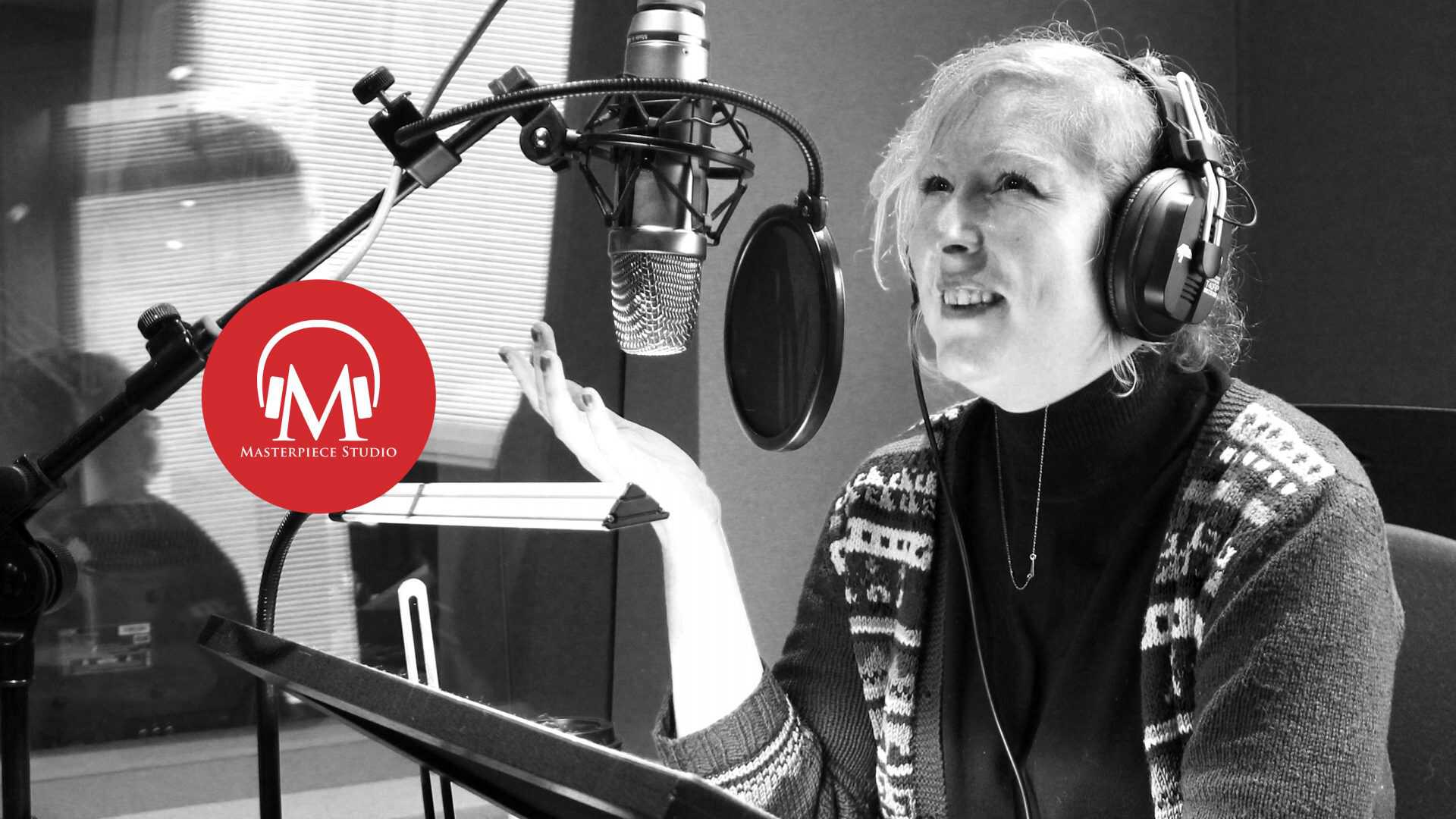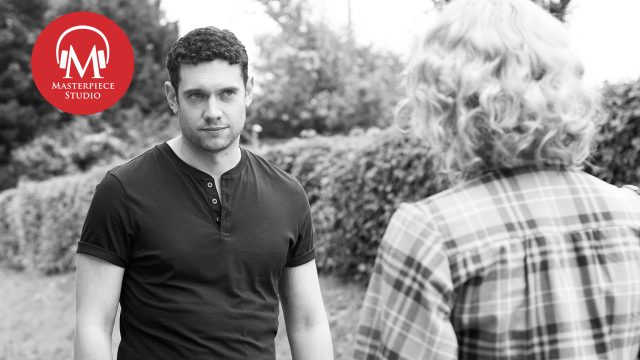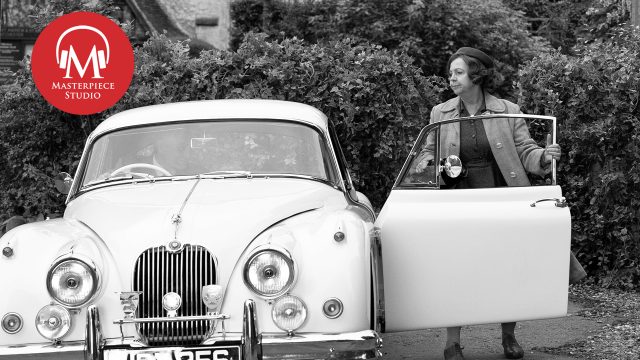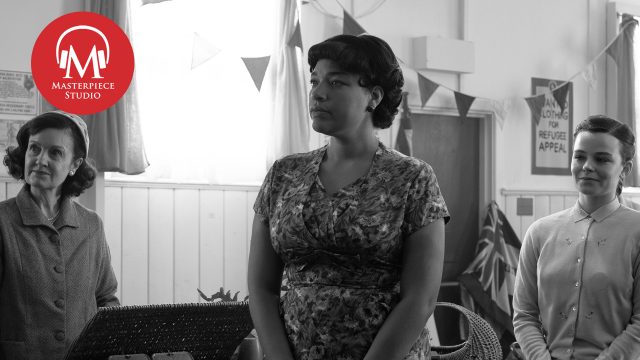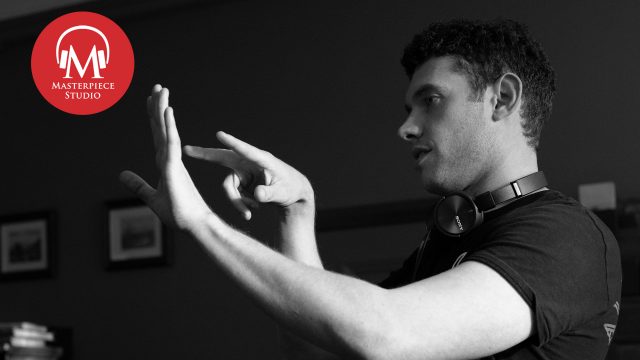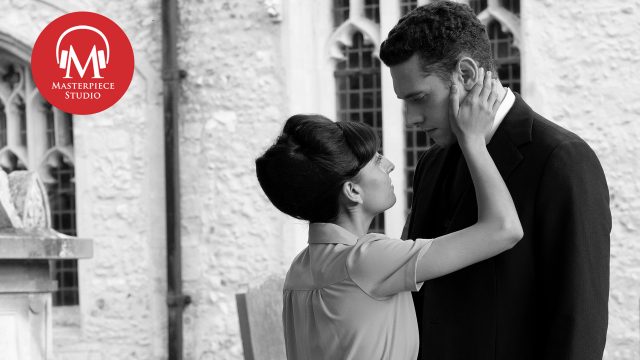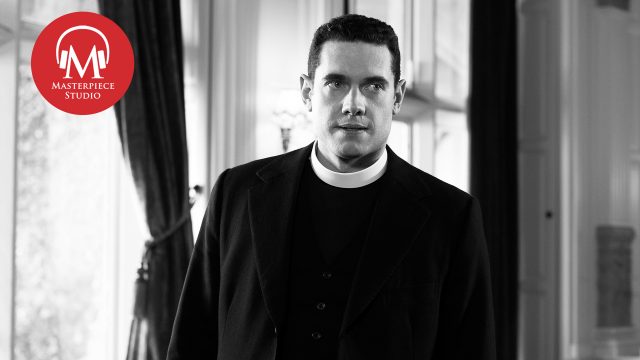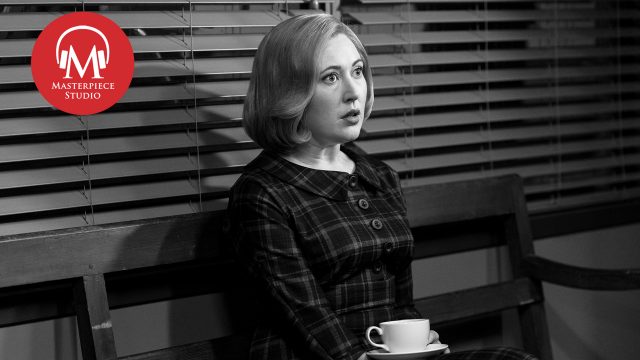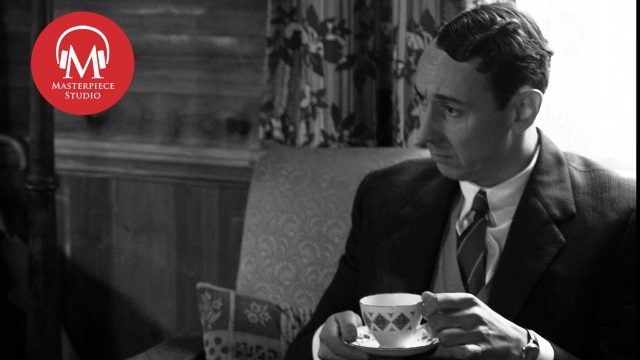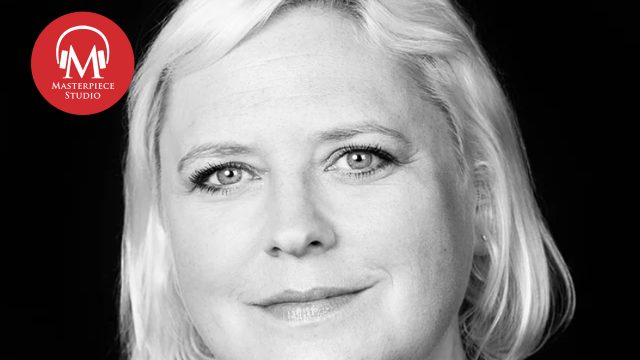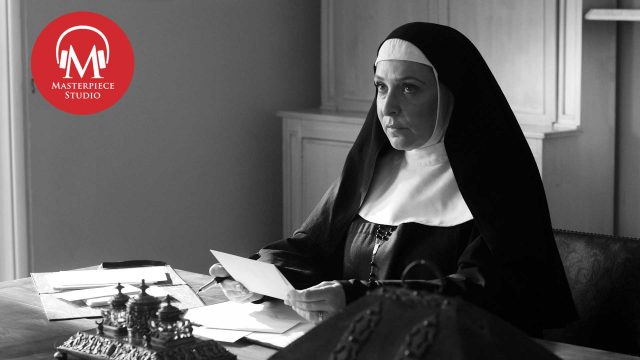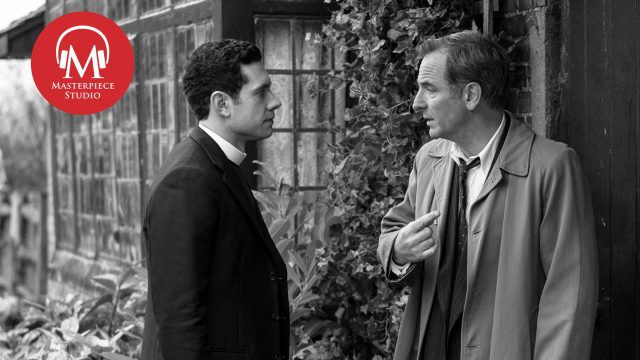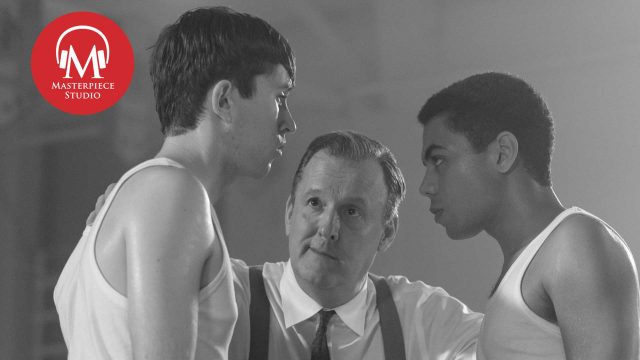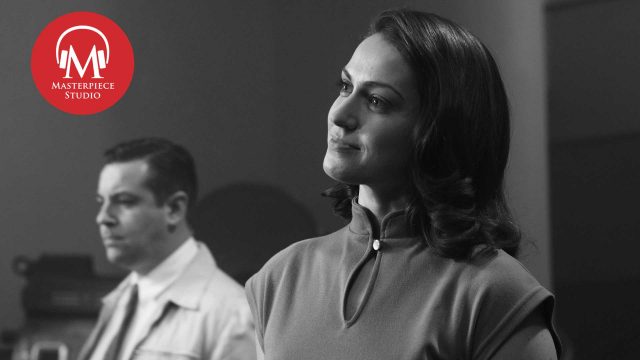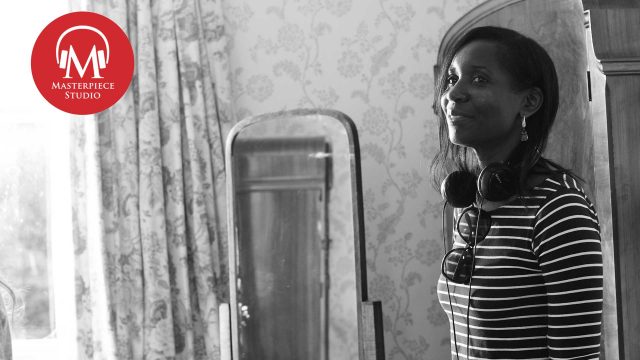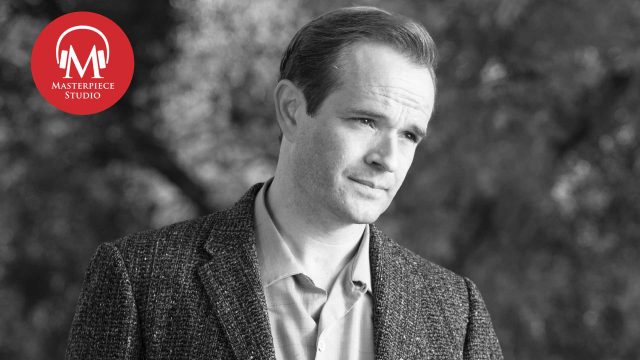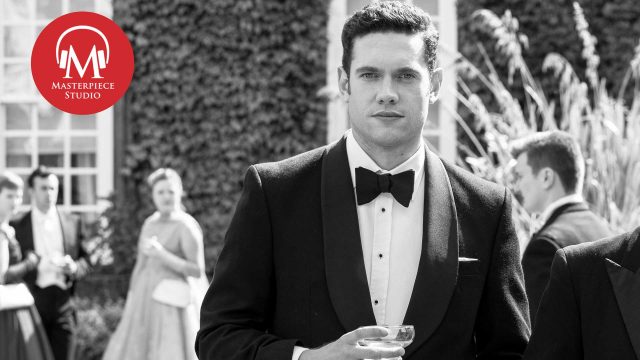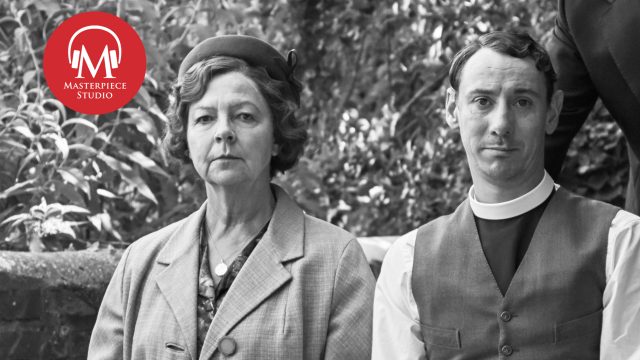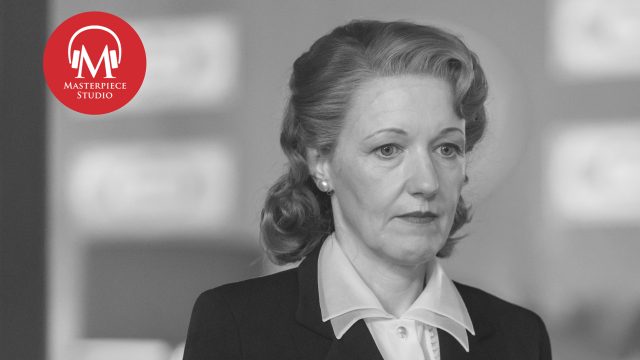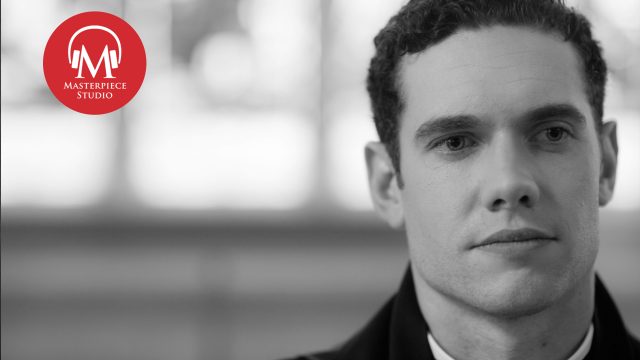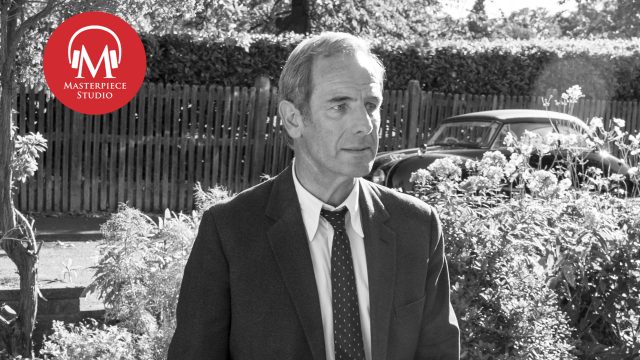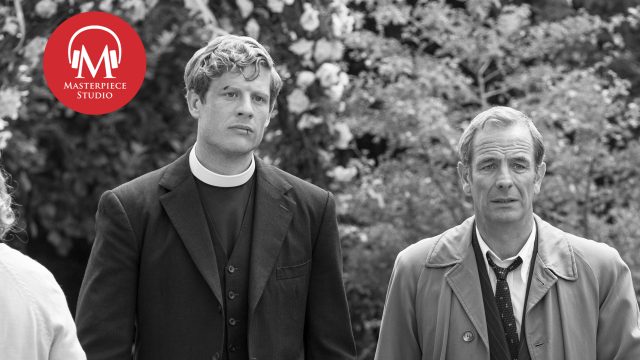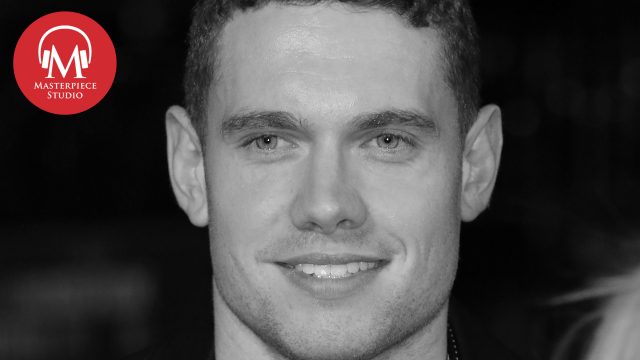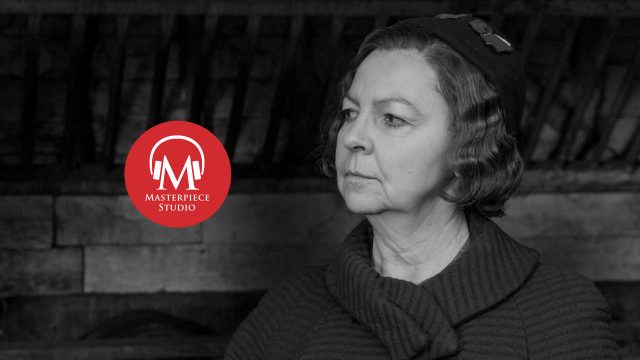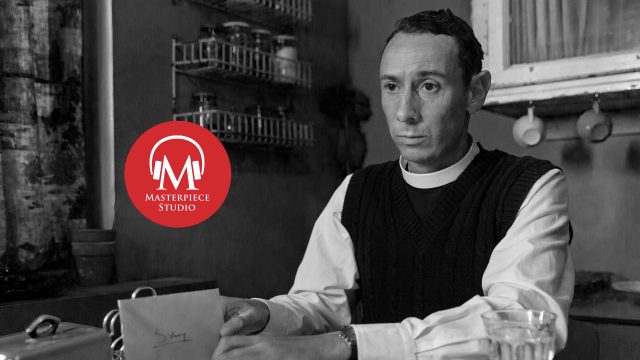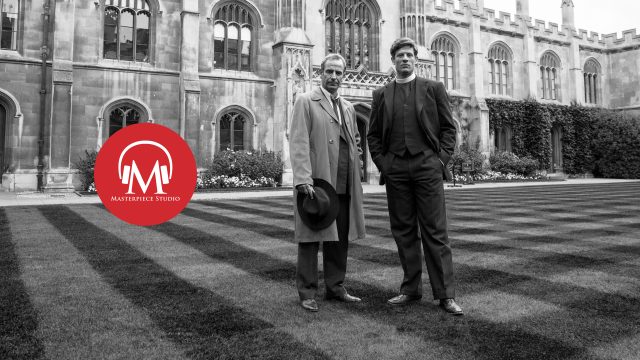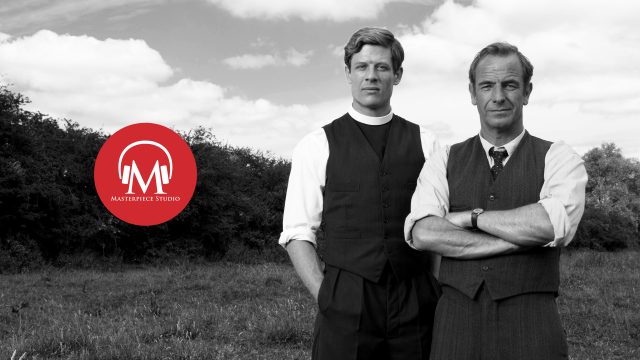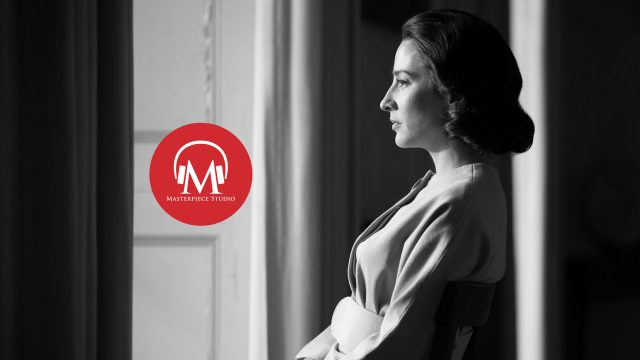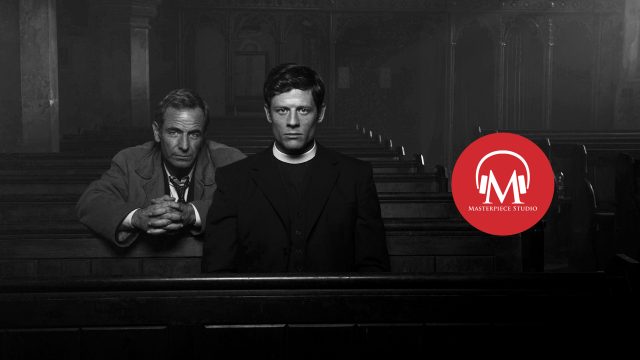Jace Lacob: MASTERPIECE Studio is brought to you by Viking Cruises, exploring the world in comfort. Learn more at vrc.com
I’m Jace Lacob, and you’re listening to MASTERPIECE Studio.
Another season of Grantchester is done and dusted, and it’s been a dramatic and interesting few months for nearly everyone in the village.
In Grantchester, the romances are as volatile as the murder mysteries. This season, as lead writer Daisy Coulam told us:
CLIP:
Daisy Coulam: I don’t think people expected this show to go to sexy places.
Jace: Some romances ended, others were renewed, and—for Mrs. Maguire at least—wedding bells rang.
CLIP:
Sidney: To love is to live. And we must do so with all our hearts and with all our soul and with all our might. If you would raise your glasses to Mrs. M and Jack.
Mrs. C: Mrs. C!
Sidney: To Mrs. C, and Jack!
Crowd: Mrs. C and Jack!
Sidney: And, to love.
Crowd: To love!
But not all of Grantchester’s rollercoaster relationships were wrapped up as neatly at the end of the season.
Detective Inspector Geordie Keating dumped Margaret and tried to make his way back to Cathy. Leonard Finch abandoned Hillary and reignited a spark with Daniel. And the Reverend Sidney Chambers kept his faith but lost his Amanda.
CLIP:
Leonard: Maybe people aren’t ready for us to be honest. We should be honest with ourselves.
Jace: Daisy Coulam, Grantchester’s lead writer and executive producer, returns to the podcast this week for a special conversation about the season that was.
And we are joined again this week by writer and executive producer Daisy Coulam, welcome.
Daisy: Hello, thank you.
Jace: Season two dealt with some heavy issues of crime and punishment, while season three dealt a lot with secrets and lies. Particularly those we tell ourselves. Uh, thematically what did you set out to explore this year with the story?
Daisy: Well, very quickly we found our theme, I think, because of Sidney and Amanda’s situation, their relationship, which basically cannot be. We very quickly, sort of, stumbled upon a theme of love versus duty. It’s a huge conflict for Sidney, he, he loves his job, he has a duty to the church, but he- he is in love with a woman and it’s the tension between love and duty that plays out through the series and for most of our characters actually, so we’ve got Geordie struggling with his duty to his family and his love for another woman, and we have Leonard struggling with his … again, his duty to the church and his burgeoning kind of sexuality. It very quickly became clear that it worked for everyone and it really infused the series with quite a lot of tension and conflict.
Jace: I mean, ultimately Sidney does choose his priestly duty to the parish over a chance of personal happiness with Amanda.
Daisy: Yeah.
CLIP:
Sidney: I wanted this. I wanted it so much.
Amanda: I let myself believe you when I, I knew all along.
Sidney: I love you.
Amanda: You love me? You love me, what about Grace?
Jace: Why is it so impossible for him to- to choose Amanda and seize this chance at happiness for himself?
Daisy: It’s really interesting, from the very beginning we’ve said that Sidney in a sense, his whole wartime past, everything that- everything that’s happened to him, everything that’s informed him … he doesn’t think he deserves happiness. This is the subtext of it for me always has been that he … he feels he’s not good enough for Amanda and yeah, he’s not he is … the church is he and he is the church. He- he is a vicar and he loves that job and it- it’s who he is. It’s not just a job for him, it’s- it’s exactly who he is and he can’t turn his back because he- he loves helping people. He loves that probably more than Amanda and it- it’s terribly sad but who knows what will happen in series four?
Jace: When she finds Sidney’s resignation letter still at home, Amanda realizes that she will always come second to the moral needs of the village, but she has to put herself and her child first. Was their love always doomed from the start?
Daisy: In my head it’s always been doomed, but I- I love them when they’re together, but there’s always been that … I mean from the very first scene where you see them in the very first episode where they’re sitting having a picnic, and she’s already out of his reach. She’s already engaged and it … in a sense they’re each other’s first loves and sometimes first love is doesn’t work. Sadly.
Jace: Was this always the endgame that you envisioned for Sidney and Amanda? Or has that changed over the last three years of constructing these episodes?
Daisy: It has changed and it’s sort of organizing process when you’re storylining. It … you know things, um, you know sometimes storylines will appear … will be know from the very beginning, and sometimes things, kind of, just flow, and … or actors will come up with ideas…but I think it was inevitable. I think subconsciously we all knew that there was going to be a sad ending.
Jace: And how difficult was it to write this break up scene between Sidney and Amanda?
Daisy: It, again, this was a scene that went through quite a few drafts, because it needed to be … you needed- it needed to sense the finality of it without being too kind of melodramatic, so at one point, I had, and in fact I think in even in the final script she was kind of swearing at him and getting angry, and then we realized, no it’s more about the sadness. It’s about … yeah, the inevitable sadness of it and we- they play it so beautifully and quietly that … yeah, it’s quite devastating actually.
Jace: Could this be the end for Amanda Hopkins on the show?
Daisy: I hope not. I would hope not. I mean, I think, in a sense that star-crossed lovers they’re were always, you know, those people who were your first loves always pop up again at some point, er, inevitably, probably at the worst possible point, when you’re just about to get married, or something, but I would hope not because, well, I love Amanda and I also think Morven is just one of the classiest British actors around at the moment.
Jace: Some viewers have vilified Amanda as if she were to blame or that calling Sidney a selfish bastard was somehow undeserved. How do you respond to those reactions or in another way why are some viewers so quick to blame her.
Daisy: I don’t know. I find it quite difficult actually when I read those, kind of tweets. It’s, um, because … sometimes it comes from a place where people are trying to protect Sidney from sadness or something, or they feel like, um … I don’t … and I worry sometimes it comes … this probably and I don’t mean to put this on the people who write those tweets but sometimes it’s- it feels quite misogynistic, maybe? I don’t know. That … the blame … blaming the woman. I don’t know or maybe they feel she was unsympathetic, I don’t know, I find it very hard when people are mean about characters that I’ve sort of are in my head and I feel like I know them like my family. So I’m not quite sure … yeah, they didn’t- some people didn’t warm to her but I think that was unfair really. I think it’s a generational thing too because a lot of people on Twitter are, obviously younger and therefore, um, I don’t know, have those kind of feelings whereas my mum and dad totally understand it. They’re you know in their late 60s, 70s and they understand it. It’s you know she … it- it’s a tricky situation and the social mores of those times and you know? I wonder if it’s something to do with that as well.
Jace: Everyone’s secrets came spilling out at the charity ball.
Daisy: Oh yes.
Jace: And the love triangle between Geordie, Margaret and Cathy came to a head. Uh, back when you were plotting this season, how early did you know that you’d drive a wedge between Geordie and Cath?
Daisy: When we were storylining it, we had all these big secrets and then we were just like, ‘Let’s put them all in one episode, let’s do this!’ From the beginning really we wanted Sidney and Geordie to be … not to be at odds but to be each other’s confidants and through this series rather than, you know, kind of being … falling apart. They’re- they’re there for each other, so we were like let’s, you know, chuck everything at them in this one episode and see … and try and thematically play off that kind of duty versus love. So that was quite fun. Also, I was in that episode.
Jace: Were you in that episode? Where were you?
Daisy: I was. In the ball scene with my husband, in a yellow dress, slightly like a plump chicken in the background. But it was such a long day, that day. They filmed, to like, eight or nine hours or whatever just in that one room. But quite fun to see it all come to life.
Jace: Were James’s parents also in that scene?
Daisy: They were. They were, so, they were standing, there’s quite a good closeup of those two actually. I’m quite glad there was no closeups of me which, I was actually quite glad about in the end, but, they get a little, they’re chatting to Geordie at one point, um, but apparently, well I know that James gets his dad in everything he does, he always puts his dad in there. Somewhere and his mum was persuaded this time to be in it as well, so it was quite fun.
Jace: Geordie and Cath dance and make the first steps towards reconciling at Mrs. M, now Mrs. C’s, wedding. I love the line in the midst of the nappies and the laundry, “I forgot it was you and me.” Can they truly repair that rift or will the underlying issues between them continue to plague them?
CLIP:
Geordie: I thought you might like a drink.
Cath: Thank you.
Geordie: I forgot didn’t I? In the midst of all the nappies and the laundry? I forgot it was you and me.
Cath: I never forgot, Geordie.
Daisy: Well we always sort of said that Geordie and Cathy in a- in a sense are the true sort of 50s couple. They’re not forward thinking like Amanda, they’re not kind of … they’re- they’re very, in those days I think people did, you know, some people had affairs and then you just stayed married because that’s, that’s what you did and- and for me I think whatever problems you throw at Geordie and Cathy, they’ll stay together. I just think, forever until, you know, they’ll be an old couple kind of slightly bickering but always and … they do love each other. They do. I think, you know, long marriages. Sometimes problems occur.
Jace: One of the most affecting storylines this season was Leonard’s struggle. First his engagement to Hilary and then his suicide attempt. Ah, where did the idea for Leonard trying to kill himself come from?
Daisy: Ah, you see this is a case of a storyline coming from the actor actually. We were- we must have been filming season two and I was in the car with Al going to set and he said, I really think that, that Leonard would make a suicide attempt at some point. He said, “Oh, I think he’d take a bunch of pills and just come down and announce that he’d taken a bunch of pills,” and I was thinking, I kind of kept playing over that in my mind and going he totally is the kind of character who would very quietly do something very drastic and, so, yeah, we- we kind of took that to Emma, the producer and she thought that was a great idea, and so we kind of fitted it in, and it worked really well for Sidney because it kind of works as a push for him to go, the church, we’re living by these rules of the church and sometimes it damages people, so we kind of used it as a catalyst for him to go off the rails, really.
Jace: Leonard and Daniel close out the season by kissing at the wedding reception as Leonard acknowledges that the least they can do is be honest with themselves.
Daisy: Hmm.
Jace: Does this moment prove that these two are strong enough to overcome the professional and even legal obstacles in their way?
Daisy: I think … well, I think what basically, they’re going to have to do is live this secret kind of life which, but, as- as- as you say in that quote, Leonard’s basically saying, “We’ll be honest with each other. No one else can know about this but we- we’ll just quietly live our lives,’ and again, I think there were quite a few people who did that in those items. That … there were … of course there were gay people in the 50s. You just didn’t hear about them because they weren’t allowed to say it out loud. I’m pleased Leonard’s got a moment of happiness frankly because he- he deserves it.
Jace: You said in a panel discussion that you had quote ‘Made a strict rule that Sidney can have a crisis of self, rather than a crisis of faith,’ unless you get to series three.
Do you feel that the two merged this season? Sidney’s twin crises, or are they one and the same the, the crisis of self and the crisis of faith for- for a vicar?
Daisy: Well, for me? Still- I didn’t don’t think that Sidney’s had a crisis of faith in the sense that he hasn’t renounced God. I think, God will always be there for Sidney. This, in a sense this series is about his crisis of faith in the church. In the institution and he’s just- just seeing all around him. Mrs. M is struggling, trapped in a life she didn’t choose because, because she has to remain married to this man because it’s scandalous if you don’t and Leonard’s trapped in a lie, he can’t be with Amanda. Every- everyone around him is struggling with these institutional rules and for me, God hasn’t left his side and he’s not left God’s side, but yeah, he’s really grappling with those kind of of themes of rules and regulations.
Jace: My favorite reaction to the rather, unexpectedly hot sex scenes this season on Grantchester came from @chloearmstrong1 on Twitter who said, quote, “I don’t know why Grantchester is so horny all of a sudden but I’m here for it.” Were you surprised by the shock over those scenes this season?
Daisy: I was. I was shocked. Funny enough, I retweeted that one because it made me laugh. I don’t think people expected this show to go to sexy places and, um, um, we- we were like, you know, “We’re going to shock people with these scenes.” Although, yes, the sex scene with Geordie and Margaret was a little bit shocking for me as well. I must say, when I saw the rushes I found it quite hard to look at. That’s the thing with this show. We should, we should push it to … to kind of dark and interesting places, otherwise it becomes too soft and sweet and I think that would be detrimental to the show.
Jace: The episode ends on Geordie’s line, “It’s the game Sidney. It’s the game.” Uh, which is the same line at the end of Grantchester‘s first episode.
CLIP:
Geordie: Let me set you up with a girl.
Sidney: Buy me a pint. And shutup.
Geordie: Backgammon?
Sidney: If we must.
Geordie: Oh, it’s the game, Sidney. It’s the game.
Daisy: Yes.
Jace: There’s a real sense of finality here. Could this be a series finale ultimately or is there a sense that the show will be commissioned for a fourth go around?
Daisy: Well, it’s really funny. We still don’t know. We’re waiting for news, but, I always worry with these things like series like Deadwood, which I absolutely adored and then they found out they’d been canceled, and it ended in a slightly odd place and you thought, well, if you’d … if they’d known they were going to be canceled, you know, would they have wrapped it up neatly, so we’ve always had in the back of our minds, “Just wrap it, you know so that it, if- if … I’m touching wood now. If worse came to worse then it didn’t come back, you wouldn’t feel like that it wasn’t complete in some way, so who knows … I’ve really, I’ve- I’ve season four that would be marvelous. If we could. It’s just- it’s just get every- everyone in the same room really. James is off being famous James Norton and Robson’s off. He’s start- he’s doing an amazing new show and he’s doing his fishing and everything and everyone is super busy, so it- it’s a case of pulling them all back but hopefully we could do it.
Jace: And with that line did you try to signal that this could be an end if it is?
Daisy: Yeah I suppose so. I was- I was thinking, you know, worst case scenario basically, I was thinking would I be happy? If this was the last scene ever I can- I can safely say, ‘All right, you know, I feel like we’ve come full circle and we’ve still got a lovely friendship they’ve got their dog and, you know?” It felt like a fitting ending if … but hopefully not. Hopefully not.
Jace: Hopefully not. Do you have a favorite scene from this season of Grantchester?
Daisy: Ooh, I think one of my favorite scenes is, er, Sidney comforting Leonard in his bedroom after the suicide attempt. I just think those two li- light up the screen when they’re together and there’s just something quite tender about one man comforting another man and just … it was beautifully done, but I have so many favorite scenes. Mrs. M crying. Mrs. M getting married. Ha, just … Cathy when she finds out about the affair, when she, um, says, “You brought her a necklace and you brought me a food mixer.” Just like, “Oh, god. You’re so good.”
CLIP:
Cath: You bought me a food mixer. You bought her a necklace. Do you love her? (Sobs)
Jace: If this does for some reason end up being the end of Grantchester what do hope that viewers take away from this show and these characters?
Daisy: I hope they take away that religion is something to be thought about and it’s something to explore rather than dismiss. I’m not religious myself but, I- I feel quite strongly that- it shouldn’t be something that’s laughed at. It should be something that’s explored and is complex, but also I think … I hope they enjoyed Sidney and Geordie and Amanda and Cathy and Leonard. I just hope they enjoyed those characters and got some kind of pleasure from them really, because for me that’s what it’s all about, it’s those, it’s those central characters and how much I love them really.
Jace: And what is- what’s your typical writing process like on a given day?
Daisy: It involves a lot of procrastination. but actually weirdly, I think procrastination is a part of the process, but I tend to be an early riser, coffee driven and lots of film soundtracks to listen to. That’s where I seen to get my inspiration from and then I’ll just probably I don’t know, write about eight or nine pages a day, maybe? Depending on the deadline or how little time I’ve left myself, but what’s good about our team is is that it’s very much each draft will be a work in progress and lots of people will throw ideas in and … I actually like … I’m not one of those writers who doesn’t take ideas very well I’d much prefer it if people … the more ideas the more kind of you know thoughts they can throw in the richer it becomes I think.
Jace: So, what was the soundtrack for this- this year then? What were you listening to?
Daisy: Oh, a bit of “Frost/Nixon.”
Jace: Wow.
Daisy: Was very good. Erm, er, what else? I listen to a lot of Thomas Newman and a lot of so, kind of “The Help,” and “American Beauty” and stuff like that. Quite melancholy stuff actually. But any- anything without words basically. If I have- if there’s any kind of singing, I get very distracted and so I need something with … just kind of classically music, but yeah, lot’s of stuff. I find film soundtracks really … It makes you think more visually I think and makes you kind of think bigger rather than in a room.
Jace: Was there a specific television show that first ignited your passion for writing for television?
Daisy: There was a show called … It’s called “The Storyteller.” It was, um, a sort of Jim Henson.
Jace: Jim Henson, yes.
Daisy: Yeah, and it- it was, um, written by Anthony Minghella who obviously went on to direct “The English Patient” and things, but he- he grew up on the same … on the Isle of Wight, which is a small island off the coast of England where I grew up, he grew up too, and I remember thinking, “Somebody from where I live wrote this and it’s amazing,” and it was so beautiful. The writing was so beautiful it really inspired me and we had it on… my sister and I had it on VHS and we we watched it so many times that it warped and the VHS was just completely warped and I just, you know, we could quote bits to each other and I- I just thought that was amazing that he was just a guy who went to a school near where I went to a school and- and he then went on to win Oscars and, so I suppose that was the first time I really thought, you know, this is what I want to do. Actually, you know I didn’t even really think I thought that then, I think it probably took me until I was in my 20s to really think about it but it was just inspiring.
Jace: I mean, over your career, you’ve said, quote, “I knew I wanted to do something in film or TV, but I went in at the bottom, making people’s tea.”
Daisy: Yes.
Jace: And how- how did you get your start writing in and- and what do you see as your first, big, significant accomplishment in that arena?
Daisy: So, yeah, I did, I started, I remember, it was almost the days before email. I- I wrote, um, 100 letters to different companies and one company got back to me and said, “Do you want to be a runner?” So, I started off as a runner and then I- I worked as a script editor, my first, sort of jump up was to be a script editor, which again, I don’t think you have in America, but is kind of working with writers and shaping the script basically, and, um, I worked on a show called “Where The Heart Is” which was a, sort of medical drama, and then from there, yeah that was my big break really I suppose and then that was kind of the point where I started to go, seeing what writers did and think, that looks really cool, and you get to work from home, In your pajamas if you want to. And yeah so, then I just worked on lots of different shows. Big, big shows like, well, big in terms of scale, in terms of the amount of people, “Eastenders” and “The Bill” and things like that, yeah and it’s people you meet along the way really and I think it’s just how these things work you just meet people with similar sensibilities like Diederick Santer, who- who’s been a real champion of my career really and give me my biggest break which was Grantchester, so, it’s all down to him really.
Jace: And, because you seem to be as obsessed as I am, can we talk very briefly about how amazing season three of “Unbreakable Kimmy Schmidt” is?
Daisy: Oh I just love it. I just … We- we went back, my husband and I, very geekily went back and watched seasons one and two again and then watched season three. It’s just so funny, isn’t it? It’s just-
Jace: Genius.
Daisy: Like, brilliant and just so fast. So clever. You almost need to watch it with subtitles on because you almost miss kind of just all the little in jokes and little references back.
Jace: I watched everything with subtitles on, so yes.
Daisy: Do you?
Jace: Yes, yes. Yes.
Daisy: It’s a good way to do it actually. I think um, by dad introduced me to it. My dad’s a bit deaf, so first time he did it I was like, “Oh, god it’s a revelation.” I can hear what they’re saying. It’s just such a warm show and there’s just so much kind of depression in the world and on telly that you kind of think anything warm I’ll happily watch.
Jace: The optimism plus Titus I think is what does it.
Daisy: Oh.
Jace: And this was the year of Titus, I think.
Daisy: He’s brilliant. When he does his Lemonade bit it’s just brilliant.
Jace: Yes. And finally what’s next … what’s next for you.
Daisy: Well, it’s very weird being a writer. You kind of work, you kind of fill your head with one shew and then you think, “Oh, no what next? Exactly, what next?” So I’ve got a few. I’m working a lot with Diederick and Emma, the producers. We’ve got an idea that we’re touting around at the moment, so, uh top secret at the moment, but hopefully if that comes off, we kind of trying to get some interest in that and then I start getting the fear basically around this time, like, “I will never work again,” but I think that’s every writer. But hopefully, hopefully something new and interesting and set in the Civil War of in UK in 1600s. So-
Jace: Ohh.
Daisy: Different, very different.
Jace: Intriguing.
Daisy: Lots of swearing. Very unlike Grantchester.
Jace: Well, fingers crossed.
Daisy: Thank you.
Jace: Daisy Coulam, thank you so much.
Daisy: No, thank you it’s been lovely to chat.








